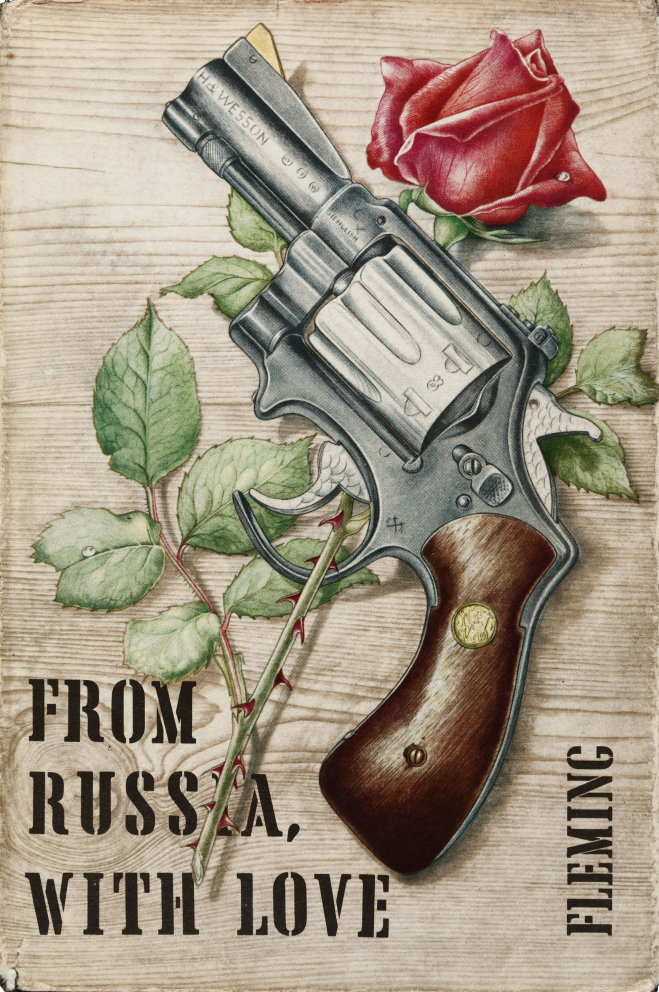

“Danger, like a third man, was standing in the room.”
From Russia With Love stands out in Ian Fleming’s James Bond series (at least what I’ve read of it thus far) due to its unconventional structure and strong ending. It is initially off putting because the series’ main character doesn’t show up until chapter 11 but also features the most fleshed out villain because of it. As a result, the climactic encounter feels particularly strong here, but at the expense of a less engaging buildup. In my estimation, the narrative choices and the sacrifice of James Bond action content was worth it, leaving us with the strongest James Bond outing yet, and serving as the source material for one of the best Bond films.
The plot, like most of those Fleming concocted, is far-fetched and requires suspension of disbelief. SMERSH, the Russian counter-intelligence agency, wishes to take a nasty poke at MI6. They plan to do so by humiliating James Bond, who has been singled out due to his roles in defeating SMERSH operatives in the past (Casino Royale, Live and Let Die). They utilize the services of their executioner, Donovan “Red” Grant, a psychopathic British Army deserter whose bloodlust coincides with the full moon. SMERSH’s head of operations, Rosa Klebb, and their master strategist (a world-class chess player), devise a plan to lure Bond into a trap. They utilize a promiscuous young cipher clerk within their organization, Tatiana Romanova, who wishes to “defect” from her position after a photograph of the handsome Bond comes across her desk. To sweeten the deal, she is willing to leave her post with the Spektor, a Russian decoding machine.
Tatiana contacts MI6, offering to defect with the Spektor on the condition that she is escorted by Bond. Of course, the trap plays right into Bond’s conceited view of himself, and although both he and M believe that it is a trap, they agree that the Spektor is valuable enough to risk it. When he returns from a night out to find Tatiana all but nude under the covers of his bed, he only suspects the scantily clad woman for about two seconds. Then he is in love, traveling with the Russian bombshell aboard the Orient Express and dealing with the three MGB operatives aboard the train with them.
The episode on the train is the novel’s most exciting section, but the preceding buildup is a varied and occasionally interesting affair. Plenty of pages are spent detailing the lives of Donovan Grant and Tatiana Romanova, as well as Bond’s adventures in Turkey with Darko Kerim, head of the Turkish station of British operations, prior to the escort. The action set pieces are all extremely intense, and a smattering of other tangents add good flavor. Bond is invited to dinner with a band of gypsies, where he witnesses a tribal duel between two women who are both in love with the tribe leader’s son; he is treated to a midnight excursion through a rat-infested tunnel; he witnesses a sniper fight as Kerim’s target tries to escape through Marilyn Monroe’s mouth, her face painted on a large billboard. And all of this is mostly part of a secondary plot concerning Kerim. Its all but unrelated to Bond’s actual mission, which involves poison-tipped knitting needles, fake passports, drugged wine, schoolboy tricks, and clever gadgets.
Fleshing out Grant and Romanova proves valuable. When Grant shows up on the train near the end of the book, there is a certain weight to his character that just wouldn’t be there if he was merely “a SMERSH agent.” The son of a German wrestler and an Irish hooker, Grant feels no pain, is uninterested in sex, and takes a perverse joy in causing physical pain to others. Likewise, Romanova is more fleshed out than any of the previous Bond girls, and so the reader has a greater concern for her fate. Even Darko Kerim is a decently rounded character, with his harem of wives, legion of sons, and gypsy connections, especially considering that he is a relatively minor character that is killed off later in the novel. Bond himself is also a more nuanced character in From Russia With Love than in previous outings. The novel begins with a Bond grown soft1 and doubtful of his motives and he remains morally conflicted throughout. That Fleming decided to close the novel with a major cliffhanger (Bond is poisoned, loses feeling in his limbs, and passes out mid-sentence) and without a romantic coda is daring, especially considering that the author considered possibly halting the series here, but I liked the way it abruptly ended.
Despite the improvements, many of the baser tendencies displayed in previous books are still present, namely a penchant for making women get naked. There’s also a bit of overt racism. Kerim, in particular, while a fascinating character, is also a vile one, and could easily have been a villain in a different book. Many detractors try to tear Fleming’s books apart for their misogyny and racism, while many defenders point out that Fleming was a product of his time, and so these things are forgivable. While I tend to take the latter view,2 I think it is worth pointing out that an author (or a screenwriter, or a songwriter) can write characters that do not completely reflect their own beliefs. It’s true that Fleming’s characters tend towards one or the other of good and evil, but is he not allowed to write a “good” character with compromised morals? Sure, my stomach churned a bit when the gypsy king told Bond that the two women who fought would remain sexually available to Bond “until their breasts fall” and when Kerim describes chaining a woman to his dining room table and raping her, but that doesn’t mean they don’t belong in the book or that these things don’t happen in real life. It means that you, the reader, have a grasp of right and wrong that the characters that Fleming put in his novel do not have or which their perversions override. Congratulations on finding this out about yourself.
The situation is a bit murky, because Fleming is definitely casually misogynistic, which comes through in dialogue between Bond and Romanova, Tatiana immediately falling for Bond upon meeting him, and in more subtle ways that indicate Fleming was indeed a product of his era. But he also includes overt things like the chained-to-a-table rape bit, the naked gypsy fight, and the Soviet agents recording Bond and Tatiana’s coital relations from behind a two-way mirror, with indications that the voyeurs are aroused themselves. So while I dislike some of these provocative scenes, I don’t think Fleming wrote them as some kind of secret perverted fantasy. Separating Fleming’s own morals from those of his characters may be tricky, but I think it disingenuous to condemn him for the worst of them.
I don’t expect any of these books will become favorites, but that’s okay. They have given us a fun and long-running film series, and are very competent and engaging pulp fiction in their own right. If that’s all they are, that’s fine by me.
1. This contrasts nicely with Grant’s anonymous introduction to begin the novel, where the descriptions of hardened muscles and tanned skin lead us to believe our protagonist is being described. The opening scene also has a notably cinematic feel to it.
2. The only other option is to shut oneself off from all dated art, much of which has other redeeming qualities or is otherwise a time capsule through which to experience the culture of bygone eras.
Or, I suppose, one could read the book, hate it because it doesn’t align with one’s own modern, undoubtedly faultless sensibilities, ignore the rest of the content of the book—which I faintly praised for finally giving its character some moral depth, but which is chiefly focused on entertainment, not social commentary—and then complain about the moral character of the author (who died half a century ago) on the internet. You could do that.